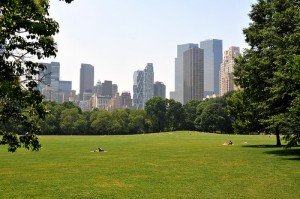A study by Kiwi and US researchers, published in Tree Physiology, shows that warmer urban nights can increase tree growth.
 Native red oak seedlings, planted in Central Park, New York, put on eight times more biomass in one summer, than those planted in close-by suburban and rural areas.
Native red oak seedlings, planted in Central Park, New York, put on eight times more biomass in one summer, than those planted in close-by suburban and rural areas.
The hypothesis that increased growth was due to warmer night-time temperatures, was then confirmed by controlled laboratory studies.
This ‘urban heat island’ effect is the result of solar energy being absorbed by pavement, buildings and other infrastructure, then radiated back into the air.
With half the human population now living in cities, understanding how nature will interact with urban trees is important. “This shows there are at least certain attributes of the city that are beneficial for trees,” said lead author Dr Stephanie Y. Searle, University of Canterbury.
Co-author, Prof Matthew Turnbull, University of Canterbury, told the SMC that the urban heat island effect may be having an impact on tree development in densely populated areas of New Zealand such as central Auckland.
More information can be found on Columbia University’s Earth Institute website.
Media Coverage:
The Press: City heat makes trees grow
Stuff.co.nz: Trees lap up the city heat
New York Times: On an Urban Heat Island, Zippy Red Oaks